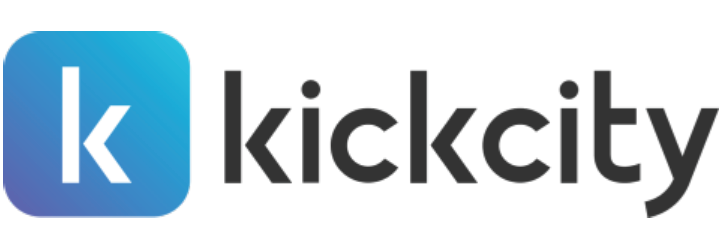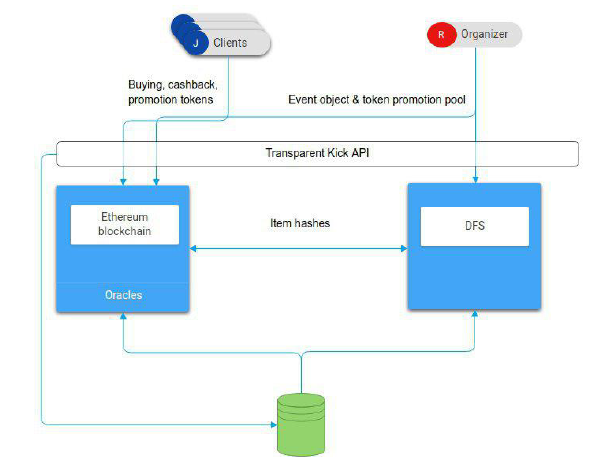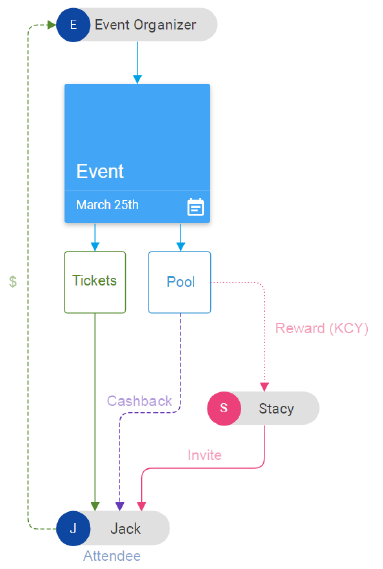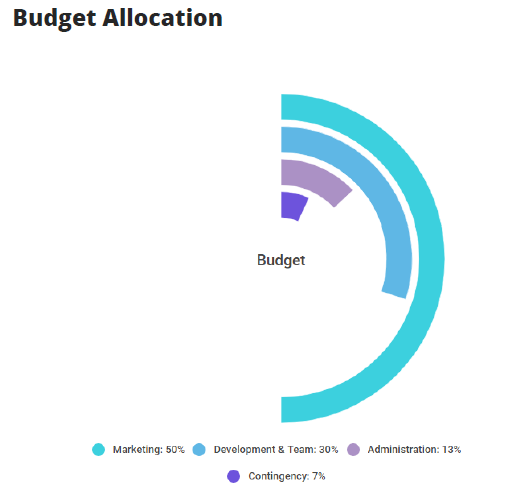KICKCITY-Decentralized Event Management &
Marketing Platform on Blockchain

Introduction
The event industry is one of the oldest industries with historical growth consistency. The US
Bureau of Labor Statistics predicts that the event industry will grow by 44% from 2010 to 2020
[2], exceeding most growth predictions for other industries. Each day, thousands of events
happen across the globe. These events happen for various reasons. Interestingly, 79% of US
marketers generate sales using event marketing (Statista).
One of the biggest problems facing the industry is marketing. Industrial statistics show that:
Bureau of Labor Statistics predicts that the event industry will grow by 44% from 2010 to 2020
[2], exceeding most growth predictions for other industries. Each day, thousands of events
happen across the globe. These events happen for various reasons. Interestingly, 79% of US
marketers generate sales using event marketing (Statista).
One of the biggest problems facing the industry is marketing. Industrial statistics show that:
• 50% of vendors have problems with getting people to respond to invites;
• 40% have problems with getting people to pay attention to invitees;
• More than 30% cannot minimize no-shows;
• Nearly 30% find it hard getting people to the event;
• More than 20% have problems with confirming who is attending.
Google and Facebook have taken over the world of online advertising with 54% and 45%
advertisement revenue respectively. Most event organizers use these platforms for online advertising while 13.6% of organizers do not have any experience running campaigns on these platforms. Organizers using these platforms face serious challenges. 73.6% that use online tools are victims of ineffective online advertisement. The current centralized online advertisement platforms are designed to enrich themselves at the disadvantage of the users. An example is Jack — a concert organizer who uses a CPC model for advertising. His Action is
“buy tickets”. With average CPC on Facebook as $0.32. He gets 1000 clicks, but only 30 people
complete ticket purchase. Jack ends up spending $320.00 while his real expense based on full
conversion was $9.60. That is a 3333% unnecessary expense.
CPA system cannot interact with FB or Google API, hence it’s limited. CPA systems are also
centralized. Viral effects only happen when people have a reason to share.
• 40% have problems with getting people to pay attention to invitees;
• More than 30% cannot minimize no-shows;
• Nearly 30% find it hard getting people to the event;
• More than 20% have problems with confirming who is attending.
Google and Facebook have taken over the world of online advertising with 54% and 45%
advertisement revenue respectively. Most event organizers use these platforms for online advertising while 13.6% of organizers do not have any experience running campaigns on these platforms. Organizers using these platforms face serious challenges. 73.6% that use online tools are victims of ineffective online advertisement. The current centralized online advertisement platforms are designed to enrich themselves at the disadvantage of the users. An example is Jack — a concert organizer who uses a CPC model for advertising. His Action is
“buy tickets”. With average CPC on Facebook as $0.32. He gets 1000 clicks, but only 30 people
complete ticket purchase. Jack ends up spending $320.00 while his real expense based on full
conversion was $9.60. That is a 3333% unnecessary expense.
CPA system cannot interact with FB or Google API, hence it’s limited. CPA systems are also
centralized. Viral effects only happen when people have a reason to share.
KickCity Protocol
We propose a socially viral model for event marketing, where the vendor achieves maximum result because an unlimited number of people are rewarded for promoting his events while the attendees also get rewarded for being loyal to the platform. Every user, event, and ticket have a unique ID which is registered on blockchain. It works like this: each event has a marketing pool where vendors can allocate KCY tokens for
reward -based marketing. Once the campaign is launched, any user can click on the event and smart contract generates a unique link for the user. The User can then share this link with his friends on social media and get rewarded when there is a conversion (ticket sales or registration). Smart contracts track all transactions and automatically distribute reward
transparently.
𝐴# = { all people invited i-th person}
𝑎% = contribution of j-th person
𝑎% = 𝑎%+ &
|()| for all 𝑎%Î𝐴#
𝑅𝑒𝑤𝑎𝑟𝑑# =
𝑃𝑂𝑂𝐿
3 𝑎%
4
%5&
∗ 𝑎#
reward -based marketing. Once the campaign is launched, any user can click on the event and smart contract generates a unique link for the user. The User can then share this link with his friends on social media and get rewarded when there is a conversion (ticket sales or registration). Smart contracts track all transactions and automatically distribute reward
transparently.
𝐴# = { all people invited i-th person}
𝑎% = contribution of j-th person
𝑎% = 𝑎%+ &
|()| for all 𝑎%Î𝐴#
𝑅𝑒𝑤𝑎𝑟𝑑# =
𝑃𝑂𝑂𝐿
3 𝑎%
4
%5&
∗ 𝑎#


The algorithm for distributing values among users is roughly equivalent to the following Java
code:
public void distributeTokens(Promoters promoters) {
Map<Id, Integer> map = promoters.getPromoters();
int total = map.values().stream().reduce(0, Integer::sum);
BigDecimal forOneContrib =
promoters.getContract().getTokensAmount().divide(BigDecimal.value
Of(total));
map.forEach((userId, contrib) -> issueToken(userId,
forOneContrib.multiply(BigDecimal.valueOf(contrib))));
}
code:
public void distributeTokens(Promoters promoters) {
Map<Id, Integer> map = promoters.getPromoters();
int total = map.values().stream().reduce(0, Integer::sum);
BigDecimal forOneContrib =
promoters.getContract().getTokensAmount().divide(BigDecimal.value
Of(total));
map.forEach((userId, contrib) -> issueToken(userId,
forOneContrib.multiply(BigDecimal.valueOf(contrib))));
}
Use Case
Event organizer Stacy creates an event ‘A’ with ticket cost at $100 per seat. She obtains and allocates 1,000 KCY tokens for marketing. Users on the platform see her event with a specified number of coins and are motivated to promote it. They can invite their friends within the platform to the event or use unique links to promote the event outside the platform. Once a ticket is
bought, the system automatically allocates KCYs to the person or a group of people responsible for the sale or event registration.
Smart contracts help enforce fair distribution of rewards based on user contribution. Attendees who buy tickets, receive rewards for buying on the platform. Users can buy with FIAT or obtain tickets using bitcoins, Ethereum and KCY tokens for less price due to the fact that third parties (banks) are bypassed. For every promotional campaign, KCY from the pool will be shared
among users who bought tickets. This will encourage people to buy more tickets on KickCity and ensure the use of KCY. Gas on Ethereumblockchain for transactions come from the pool too.
bought, the system automatically allocates KCYs to the person or a group of people responsible for the sale or event registration.
Smart contracts help enforce fair distribution of rewards based on user contribution. Attendees who buy tickets, receive rewards for buying on the platform. Users can buy with FIAT or obtain tickets using bitcoins, Ethereum and KCY tokens for less price due to the fact that third parties (banks) are bypassed. For every promotional campaign, KCY from the pool will be shared
among users who bought tickets. This will encourage people to buy more tickets on KickCity and ensure the use of KCY. Gas on Ethereumblockchain for transactions come from the pool too.
Purchase of KCY by Event Organizers
For simplicity and mass adoption, event organizers will have 2 main methods to purchase a
token for marketing.
Exchange — Event vendors can purchase KCY in exchanges according to the market value.
Credit card or other payment solutions — Many event vendors are not familiar with how
exchanges operate. For this reason, a web page will allow event organizers (only) to buy KCY
and transfer directly to their event pool. The cost of KCY on this page will always be higher than
the purchase rate in exchanges. This is to motivate vendors to buy from exchanges.
White Label and Integrations
In order to facilitate quick expansion and easy adoption, we will offer white label API technology
for KCY integration to other event platforms. We are looking at a future where KCY is the
universal event promotion token.
We are building an infrastructure that other event platforms can connect to and drive more ticket
sales by rewarding their users and improving social interaction at events.
token for marketing.
Exchange — Event vendors can purchase KCY in exchanges according to the market value.
Credit card or other payment solutions — Many event vendors are not familiar with how
exchanges operate. For this reason, a web page will allow event organizers (only) to buy KCY
and transfer directly to their event pool. The cost of KCY on this page will always be higher than
the purchase rate in exchanges. This is to motivate vendors to buy from exchanges.
White Label and Integrations
In order to facilitate quick expansion and easy adoption, we will offer white label API technology
for KCY integration to other event platforms. We are looking at a future where KCY is the
universal event promotion token.
We are building an infrastructure that other event platforms can connect to and drive more ticket
sales by rewarding their users and improving social interaction at events.

A Smart Token Based on the Bancor Protocols
KCY-tokens are smart standard ERC20 tokens which implement Bancor protocols, providing
asynchronous price-discovery while maintaining continuous liquidity by using constant ratios of
reserve tokens (BNT) held through smart contracts, acting as automated market makers. KCY
will equally be traded on the exchanges.
Benefits of Smart Tokens:
• Continuous Liquidity — since purchasing and liquidating is done through the smart
contract, smart tokens are always liquid, irrespective of their trading volume;
• No Extra Fees — the only mandatory fees applied by a smart token are the Blockchain
platform fees (gas) which are relatively low;
• No Spread — since the price calculation is done algorithmically by the smart token, the
same price applies to purchasing and liquidating the smart tokens;
• Lower Volatility.
asynchronous price-discovery while maintaining continuous liquidity by using constant ratios of
reserve tokens (BNT) held through smart contracts, acting as automated market makers. KCY
will equally be traded on the exchanges.
Benefits of Smart Tokens:
• Continuous Liquidity — since purchasing and liquidating is done through the smart
contract, smart tokens are always liquid, irrespective of their trading volume;
• No Extra Fees — the only mandatory fees applied by a smart token are the Blockchain
platform fees (gas) which are relatively low;
• No Spread — since the price calculation is done algorithmically by the smart token, the
same price applies to purchasing and liquidating the smart tokens;
• Lower Volatility.
Product Features
• Vendor Admin Panel
• Analytics & Sales report;
• Registration;
• Widget for websites;
• FIAT & Bitcoin ticket processing;
• Registration;
• Event Page & Social App;
• User profile;
• Likes;
• Attendee list;
• Event description and contact;
• Event video;
• Event comment;
• Event chat & comment.
Company Status
• Y Combinator Startup School;
• Microsoft Bootcamp Helsinki;
• Grant from NewCo &Government of Helsinki;
• Angel investment;
• Revenue Generating.
Road Map
Q4 2016 — KickCity App initial release
Q2 2017 — KickCity Event platform + initial revenue
Q3 2017 — Blockchain development and KickCity protocols
Q4 2017 — KickCity Protocol Demo and Use cases
Q1 2018 — Crowdsale “TGE” February 1st
Q3 2018 — More uses cases, More development, release of protocol API
Q4 2018 — Unicorn growth.
Token Crowdsale (1 KCY = 0.10 USD)
- Target: 12.5 Million USD;
• Launch date: March 1st 2018, 9:00 AM EST (1:00 PM GMT);
• End date: March 31st 2018, 7:59 PM EST (11:59 PM GMT);
• 1 KCY = 0.10 USD;
• 160 Million smart tokens will be available for crowdsale;
• We will accept Bitcoin and Ether;
• Bonuses:
o Day 1: 15%;
o Day 2–10 : 10%;
o Day 11–20: 5%;
o Day 21–31: 0%;
• 250 Million KCY will be created;
• 160 Million KCY will be sold during crowd sale and all unsold tokens will be
destroyed;
• 1 Million tokens will be allocated for user adoption and air drops;
• Team tokens — 30 Million (70% of team token will be vested for a maximum period
of 4 years);
• Partner tokens — 30 Million (Partner Tokens include bounty & marketing, advisors,
traditional angel investors, who invested in KickCity 2 years ago; 30% of the partner
tokens will be vested for a maximum period of 4 years);
• KickCity pool — 30 Million tokens will be retained by KickCity for future sales.
The percentage distribution of KCY tokens MIGHT change following forecasting on the Wings
platform.
After Forecasting on Wings platform:
• Price and bonus of token (KCY) will not change;
• Token allocation and distribution might change;
• Number of created tokens will not change;
• Number of tokens sold during crowdfunding might change;
• HardCap might change.
The App
https://play.google.com/store/apps/details?id=com.kickcityapp.kickcity&hl
https://itunes.apple.com/app/kickcity-all-events-with-friends/id1124097475?l=en&mt=8
https://itunes.apple.com/app/kickcity-all-events-with-friends/id1124097475?l=en&mt=8

0 comments:
Post a Comment